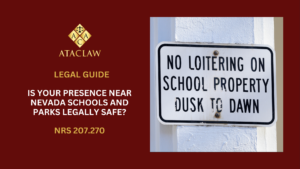In the heart of Nevada, the safety of our children remains a top priority for law enforcement and legal teams alike. Yet, a less talked about aspect that plays a crucial role in this safety net is the stringent regulation against loitering in areas predominantly frequented by children. Specifically, through the lens of NRS 207.270, Nevada casts a wide, protective net around schools, parks, and public places where the laughter and voices of our youngest citizens fill the air. But what exactly does this mean for the average person, and how does it uphold the safety of our children? Let’s unpack the essentials of NRS 207.270.

What Areas in Nevada Are Off-Limits for Loitering to Protect Our Children?
In Nevada, the law strictly prohibits loitering near environments commonly frequented by children such as schools, parks, pools, or playgrounds. This restriction is enforced unless an individual has a valid reason to be present, such as teachers overseeing students, babysitters picking up children after events, or officials like lifeguards who play a vital role in these areas.
The Reason Behind the Rigorous Law
The primary aim of this safety regulation is to deter predators and any potential threats to individuals under 18. This proactive approach helps ensure the continued safety and protection of our young ones in public spaces. However, the law also poses challenges for those unsuspecting of their proximity to such zones or the legality concerning their presence, potentially leading to unwarranted legal issues for innocents simply found in the wrong place at the wrong time.
Law Enforcement’s Approach to Upholding the Law
Generally, Nevada’s law enforcement reserves arrests under this statute for situations where there’s suspicion of severe threats, such as individuals previously identified as habitual offenders or those exhibiting behavior that could harm children. More often, if there’s no apparent risk, officers might simply issue a warning, informing the person about the restriction and advising them to relocate.
What Are the Penalties for Loitering Near Schools in Nevada?
In Nevada, the act of loitering around schools or other areas where children commonly gather is legally treated as a misdemeanor. Those found in violation of this law face significant penalties including:
- A possible jail term of up to six months in county jail
- Fines that can reach up to $1,000
These sanctions apply regardless of whether it is a first-time or repeat offense, and no leniency is shown whether the individual was alone or part of a group at the time of the offense.
Heightened Consequences for Registered Sex Offenders
For individuals listed on the Nevada Sex Registry, the repercussions of being arrested for loitering near children-centered areas are particularly severe. Such an offense could lead to the revocation of their probation and possibly result in extended sentences in Nevada State Prison. This reflects the state’s stringent measures to safeguard children from potential harm.
Is It Possible to Challenge Loitering Charges in Nevada?
Facing charges for loitering near schools or locations frequented by children in Nevada can be a serious matter. However, not all accusations lead to convictions, especially if there are valid reasons or misunderstandings involved. Here are three potential defenses that could be used to dispute such charges:
- Countering False Accusations
Misunderstandings, jealousy, or anger can sometimes lead to unfounded accusations. ATAC LAW can work to question the accuser’s credibility and aim to prove the innocence of the defendant. It’s worth noting that those making false allegations may themselves face legal consequences for filing false police reports under NRS 207.280. - Not Actually Loitering
The act of merely being around school premises isn’t considered loitering unless it fulfills specific criteria. ATAC LAW might argue that the individual was only in the area for a brief period and did not engage in actual loitering, which could lead to the dismissal of the case by the district attorney. - A Justifiable Reason for Presence
Being in the vicinity of a school or a similar area is not inherently illegal, especially if there’s a legitimate purpose behind it, such as waiting to pick up a child. If ATAC LAW can present evidence showing the individual had a benign and logical reason for their presence, it’s possible that the charges could be dismissed.
It’s important to note, however, that claiming ignorance of the law, possessing no illegal substances or weapons, or having a clean criminal record does not constitute a defense against loitering allegations.
How Soon Can You Seal Your Record in Nevada?
In Nevada, if you’ve faced loitering charges, you have the opportunity to petition for a record seal one year following the case’s closure. Interestingly, if your case was dismissed, you’re eligible to seek a record seal immediately, without any waiting period.
Given the negative impact a loitering record can have, such as social stigma and complications during background checks, seeking legal advice on sealing your criminal record is highly recommended. An attorney, particularly from ATAC LAW, can guide you through the process efficiently, paving the way for a clearer future without the shadow of past charges hanging over you.
While the intentions behind NRS 207.270 are undoubtedly geared towards protecting our children, it also serves as a reminder to every citizen about understanding and complying with local laws shaping our community’s safety net. If you ever find yourself uncertain about the legality of your presence near schools or public places where children gather, recall the essence of NRS 207.270.
At ATAC LAW, we’re committed to not only defending the rights of our clients but also to educating our community about the vital layers of protection woven into our legal system. If you find yourself needing clarity on loitering laws or any aspect of Nevada’s criminal law, our expert team is here to guide you through.
For further legal assistance and to discuss your case with an expert, don’t hesitate to contact ATAC LAW.
